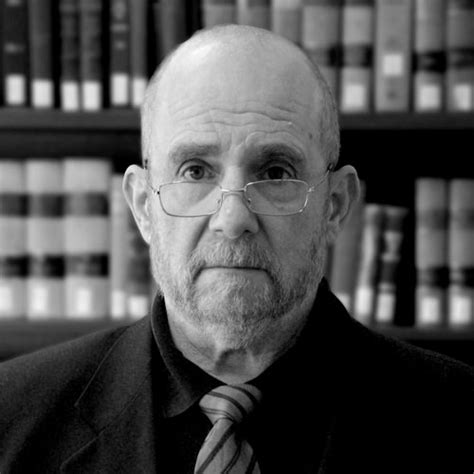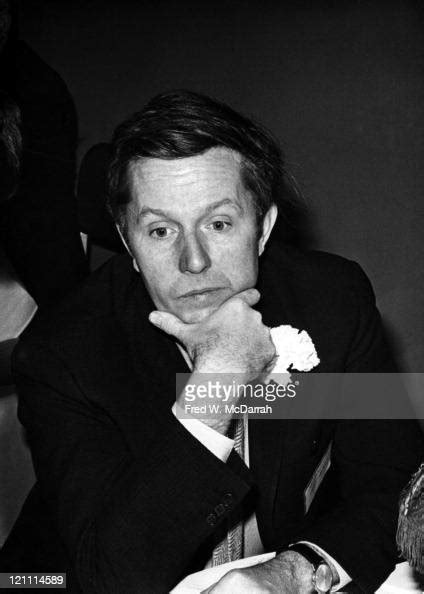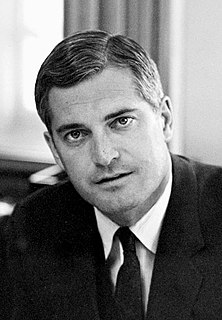Top 362 Institutional Quotes & Sayings - Page 6
Explore popular Institutional quotes.
Last updated on November 8, 2024.
White privilege is the other side of racism. Unless we name it, we are in danger of wallowing in guilt or moral outrage with no idea of how to move beyond them. It is often easier to deplore racism and its effects than to take responsibility for the privileges some of us receive as a result of it... Once we understand how white privilege operates, we can begin to take steps to dismantle it on both a personal and institutional level.
The dominant, almost general, idea of revolution - particularly the Socialist idea - is that revolution is a violent change of social conditions through which one social class, the working class, becomes dominant over another class, the capitalist class. It is the conception of a purely physical change, and as such it involves only political scene shifting and institutional rearrangements
Democratic, Republican members of Congress get along fine. But what you have is this institutional Hatfield and McCoy sentiment coming from our constituents, where the base of both sides doesn't want people to get along. But the majority of Americans, I feel, the majority, they are in the middle. They actually do want both sides to get together.
Most of these students are so conditioned to success that they become afraid to take risks. They have been taught from a young age by zealous parents, schools, and institutional authorities what constitutes failure and success. They are socialized to obey. They obsess over grades and seek to please professors, even if what professors teach is fatuous. The point is to get ahead, and getting ahead means deference to authority. Challenging authority is never a career advancer.
We raised the matter of an agreement that was reached at the Growth and Development Summit, which was that we should access a certain part, 5% was mentioned, of the funds in the hands of the institutional investors, domestically, for investment in the real economy. That being an agreement of the Growth and Development Summit, we will engage South African business to see how we can make that a practical thing. So, there is a different set of engagement with local business.
People can change their own lives, provided they have the right kind of institutional support. They're not asking for charity, charity is no solution to poverty. Poverty is the creation of opportunities like everybody else has, not the poor people, so bring them to the poor people, so that they can change their lives.
Our global institutional arrangements - the basic ground rules that govern our world economy - are human-made. They don't exist naturally, nor are they God-given. We make these rules, those of the WTO [World Trade Organization] Treaty for instance, which fill tens of thousands of pages. These words have been strung together by human beings and are also interpreted and enforced by human beings.
You should be able to criticize civil servants for what you think is wrongdoing without being painted as a cop-hater. I don't feel the police are all corrupt, however I do feel they are suffering from institutional racism and there needs to be a top-to-bottom examination of the way they practice and the way they criminalize young black and brown males. The fact that they seem to have backed off from it seems to suggest they realize they overreacted on me and it looks bad.
Another problem about writing about politics in the "age of globalization" is that so much of the violence in the form of war and also in the forms of institutional violence - sweatshops, child labor, victimization of people economically - happens elsewhere and out of sight. And when we do know about it and need to witness it, it's always mediated by images of one kind or another, so you're kind of stuck trying to write about what it's like trying to be you living your life thinking about and experiencing this stuff in that way.
I'd walk into the school, smell that institutional smell of the tomato soup, peanut butter, disinfectant, and boys room. Pass the lunchroom, see the familiar lunchroom lady with the white dress and net on her hair. At the end of 50 years of distinguished service the Board of Education gives her a bronze net - with her name on it. It stems from the Board of Education rule to keep her hair out of the food.
Contemporary scholars have little explored the preconditions of genocide. Still less have they asked whether a society's weapons policy might be one of the institutional arrangements that contributes to the probability of its government engaging in some of the more extreme varieties of outrage. Though it is a long step between being disarmed and being murdered - one does not usually lead to the other - but it is nevertheless an arresting reality that not one of the principal genocides of the 20th century, and there have been dozens, has been inflicted on a population that was armed.
We should condemn as unjust a global economic order that leads to ever-increasing economic disparities - provided this effect is foreseeable and provided it is also avoidable through some alternative institutional design that would foreseeably lead to much less poverty and inequality. Those involved in designing or imposing the existing rules are collectively responsible for the resulting excess deprivations and human rights deficits.
Autonomy means women defining themselves and the values by which they will live, and beginning to think of institutional arrangements which will order their environment in line with their needs.... Autonomy means moving out from a world in which one is born to marginality, to a past without meaning, and a future determined by others--into a world in which one acts and chooses, aware of a meaningful past and free to shape one's future.
I think at every moment in the last probably 100 years, when the institutional church had the opportunity to do the right thing, they did the wrong thing. They're a dying institution in many parts of the world because they refuse to ordain women or married people. And now they're a dying institution because some of their members did enormous harm to young people and instead of responding aggressively with humility, and with love, and with the confession of wrongdoing, they tried to spin it as though they were a political party, and that's just deplorable.
I don't know why you should isolate women in this regard. If you have a traditional leader who says 'I am the sole exclusive ruler, I am the autocrat', it will affect everybody in the area, whether they are men or women. The challenge that South Africa faces, and it is not a new challenge, a whole range of African countries have faced this challenge, is that where you have institutional traditional leadership, which in our country is protected by the Constitution, how does that institution function side by side with a democratic system?
It is my belief that exciting things happen when a variety of overlapping activities designed for all people-the old and the young, the blue and white collar, the local inhabitant and the visitor, different activities for different occasions-meet in a flexible environment, opening up the possibility of interaction outside the confines of institutional limits. When this takes place, deprived areas welcome dynamic places for those who live, work and visit; places where all can participate, rather than less or more beautiful ghettos.
Institutional psychiatry is a continuation of the Inquisition. All that has really changed is the vocabulary and the social style. The vocabulary conforms to the intellectual expectations of our age: it is a pseudo-medical jargon that parodies the concepts of science. The social style conforms to the political expectations of our age: it is a pseudo-liberal social movement that parodies the ideals of freedom and rationality.
In 1996 or 1997, out of nowhere, Fox News comes on and it's on channel 360 on Direct TV, and out of 300 million Americans, on every single night, anywhere from 3 to 5 million watch it, we're talking about at no more than 2 percent of the American public is watching Fox at any given moment. Yet, ABC, CBS, NBC, the New York Times, the institutional left, CNN, MSNBC, the record companies, Hollywood, all seem to be committed towards aligning their minds and their money and their other resources to try to shut up Fox News.
I agree completely that nothing is more important for transgender people than to have access to excellent health care in trans-affirmative environments, to have the legal and institutional freedom to pursue their own lives as they wish, and to have their freedom and desire affirmed by the rest of the world. This will happen only when transphobia is overcome at the level of individual attitudes and prejudices and in larger institutions of education, law, health care, and kinship.
As a society, almost one 1 of 2 adults has a chronic disease of one form or another. And where we're spending $3 trillion a year not on a healthcare system, but on a sick-care system that tries to patch us up after we've been made ill by a variety of institutional things around us - including a sick food system, air pollution, etc. Where we could be doing so much better even before people get to the point of getting sick.
At some time in the recent past someone had decided to brighten the ancient corridors of the University by painting them, having some vague notion that Learning Should Be Fun. It hadn’t worked. It’s a fact known throughout the universes that no matter how carefully the colors are chosen, institutional decor ends up as either vomit green, unmentionable brown, nicotine yellow or surgical appliance pink. By some little-understood process of sympathetic resonance, corridors painted in those colors always smell slightly of boiled cabbage—even if no cabbage is ever cooked in the vicinity.
But in the financial markets, without proper institutional rules, there's the law of the jungle - because there's greed! There's nothing wrong with greed, per se. It's not that people are more greedy now than they were 20 years ago. But greed has to be tempered, first, by fear of losses. So if you bail people out, there's less fear. And second, b prudential regulation and supervision to avoid certain excesses.
The attack on youth is a national pathology, unwarranted by fact, smokescreen for the failure of adulthood and its leadership to confront larger predicaments. No rescue by the monied, governing, institutional, or otherwise privileged is in sight. It's up to the energy and inventiveness of the younger generation to pull the gated minds of millennium America toward acceptance of diversity, community, and fairness, and I hope they have as much fun as I did in my adolescences achieving what we Sixties kids only imagined.
For most Black people there is still poverty and desperation. The Ghettos still exist, and the proportion of Blacks in prison is still much greater than Whites. Today, there is less overt racism, but the economic injustices create an "institutional racism" which exists even while more Blacks are in high places, such as Condoleeza Rice in Bush's Administration and Obama running for President.
There's been real hostility toward political poetry in the U.S., hostility or, at best, incomprehension. I'm speaking of those who have institutional power over what gets published, over grants andprizes and reviewing. Most of them, though not all, arewhite and male. But even as American society is unravelling, becoming more violent and punitive, wonderful political poetshave been emerging.
I think that most of my books are part of some process of self-education, often about the places I go to. Most of all, they are about the peculiar tension between institutional loyalty and loyalty to oneself; the mystery of patriotism, for a Brit of my age and generation, where it runs, how it should be defined, what it's worth and what a corrupting force it can be when misapplied. All that stuff is just in me and it comes out in the characters. I don't mean to preach, but I know I do, and I'm a very flawed person. It's quite ridiculous.
After all, [female genital mutilation is] a key pillar of institutional misogyny in Islam: its entire purpose is to deny women sexual pleasure. True, a lot of us hapless western men find we deny women sexual pleasure without even trying, but we don't demand genital mutilation to guarantee it. On such slender distinctions does civilization rest.
In a man like Friedrich von Schlegel the courage to be as an individual self produced complete neglect of participation, but it also produced, in reaction to the emptiness of this self-affirmation, the desire to return to a collective. Schlegel, and with him many extreme individualists in the last hundred years, became Roman Catholics. The courage to be as oneself broke down, and one turned to an institutional embodiment of the courage to be as a part.
We don't have to remain in this radically destructive mind-set and institutional-set. We can change, and the natural order of things could emerge in all of our societal organizations-government, commerce, religion-it's right there, waiting to happen. I often tell people that every mind is like a room in an old house, stuffed with very old furniture. Take any space in your mind and empty it of your old conceptions and new ones will rush in, good or bad. So change is more a getting rid of rather than an adding to or an acquiring.
One of the ongoing crises in America is institutional racism. We have a very broken criminal justice system. We live in a country where there are more people in jail than any other country on Earth. There are some 2.2 million people currently incarcerated and they are disproportionally African American and Hispanic. Unarmed African Americans have been abused and sometimes killed while in police custody. Clearly these are issues that must be dealt with and changed.
I was raised a Catholic as a boy and went to a Catholic boys' high school, a private school, and kind of drifted away, candidly, in my latter teen years. I consider myself deeply spiritual but not in an institutional, religious kind of a way. In Catholicism, we're surrounded by these images of martyrdom and doing penance and doing some suffering to achieve what you're trying to achieve. And I certainly embedded that in my psyche and I have lived that very effectively.
The question is gonna be, what is the pope doing? For whom is the pope doing it, if the pope is doing it for anybody? But that's gonna be what it boils down to: What is the pope doing here? Why? And I'll tell you this. The more establishment figures - and the pope qualifies as an institutional leader, and therefore the pope would qualify in many people's eyes as an establishment figure, particularly this pope, who has not hidden his ideological alignment, much less his political alignment.
. . . it is worth discussing radical changes, not in the expectation that they will be adopted promptly but for two other reasons. One is to construct an ideal goal, so that incremental changes can be judged by whether they move the institutional structure toward or away from that ideal. The other reason is very different. It is so that if a crisis requiring or facilitating radical change does arise, alternatives will be available that have been carefully developed and fully explored.
Human courtship has some wild extremes. At one end of the spectrum, there is harassment, pestering, blackmail, and an abuse of institutional power, which its targets rightly fear and loathe. At the other end is love, which as Nietzsche said, is beyond good and evil and always deserves our respect and compassion even when it is doomed or destructive. In the wide middle of the spectrum are all the ambiguous and tragi-comic goings-on of our species.
I am interested in the political economy of institutional power relationships in transition. The question is one of "reconstructive" communities as a cultural, as well as a political, fact: how geographic communities are structured to move in the direction of the next vision, along with the question of how a larger system - given the power and cultural relationships - can move toward managing the connections between the developing communities. There are many, many hard questions here - including, obviously, ones related to ecological sustainability and climate change.
we have complaints that institutional dominance of the stock market has put 'the small investor at a disadvantage because he can't compete with the trust companies' huge resources, etc. The facts are quite the opposite. It may be that the institutions are better equipped than the individual to speculate in the market.But I am convinced that an individual investor with sound principles, and soundly advised, can do distinctly better over the long pull than large institutions.
If there are dollars to be made, you destroy the environment. The reason is elementary. The people who are going to be harmed by this are your grandchildren and they don't have any votes in the market. Their interests are worth zero. Anybody that pays attention to their grandchildren's interests is being irrational. Because what you're supposed to do is maximize your own interests, measured by wealth, right now. Nothing else matters. So destroying the environment and militarizing outer space are rational policies, but within a framework of institutional lunacy.
No matter whether one feels one's gendered and sexed reality to be firmly fixed or less so, every person should have the right to determine the legal and linguistic terms of their embodied lives. So whether one wants to be free to live out a "hard-wired" sense of sex or a more fluid sense of gender, is less important than the right to be free to live it out, without discrimination, harassment, injury, pathologization or criminalization - and with full institutional and community support.
There was no mistake in us making abortion legal and available on demand. That was what we call progress. Just like it was no mistake that we abolished institutional racism in this country around the same time. The easy thing to do is lay low, but then are we who we say we are? Do we actually stand for anything, if what we do stand for is under attack and we say nothing? There is nothing to be ashamed of here except to allow a radical and recessive group of people to bully and intimidate our mothers and sisters and daughters for exercising their right of choice.
One of the basics of a good system of innovation is diversity. In some ways, the stronger the culture (national, institutional, generational, or other), the less likely it is to harbor innovative thinking. Common and deep-seated beliefs, widespread norms, and behavior and performance standards are enemies of new ideas. Any society that prides itself on being harmonious and homogeneous is very unlikely to catalyze idiosyncratic thinking. Suppression of innovation need not be overt. It can be simply a matter of peoples walking around in tacit agreement and full comfort with the status quo.
Harvard and Yale concentrated with venture capitalists that got the best calls and brainpower. Very few firms made most of the money, and they made it in just a few periods. Everyone else returned between mediocre and lousy. When returns happened, envy rippled through institutional money management. The amount invested in venture capital went up 10 times post-1999. That later money was lost very quickly. It will happen again. I don't know anyone who successfully resists this stuff. It becomes a new orthodoxy.
Contemporary Christianity, diverse and complex as we find it, actually may show more unanimity than the Christian churches of the first and second centuries. For nearly all Christians since that time, Catholics, Protestants, or Orthodox, have shared three basic premises. First, they accept the canon of the New Testament; second, they confess the apostolic creed; and third, they affirm specific forms of church institution. But every one of these - the canon of Scripture, the creed, and the institutional structure - emerged in its present form only toward the end of the second century.
Often vastly more important, international agreements are not routinely published in draft form or publicly debated, and civil society organizations and ordinary citizens often learn of important global institutional design decisions only after they have already been finalized and adopted. The only reliable way to be kept informed and to exert timely influence is by lobbying and paying the politicians and their negotiators.
Nothing is more important for transgender people than to have access to excellent health care in trans-affirmative environments, to have the legal and institutional freedom to pursue their own lives as they wish, and to have their freedom and desire affirmed by the rest of the world. This will happen only when transphobia is overcome at the level of individual attitudes and prejudices and in larger institutions of education, law, health care, and kinship.
Far from affording artists continuous inspiration, mass-media sources for art have become a dead end. They have combined with the abstractness of institutional art teaching to produce a fine-arts culture given over to information and not experience. This faithfully echoes the drain of concreteness from modern existence- the reign of mere unassimilated data instead of events that gain meaning by being absorbed into the fabric of imaginative life.
'Crowd folly', the tendency of humans, under some circumstances, to resemble lemmings, explains much foolish thinking of brilliant men and much foolish behavior - like investment management practices of many foundations represented here today. It is sad that today each institutional investor apparently fears most of all that its investment practices will be different from practices of the rest of the crowd.
I'm optimistic about Turkey's prospects for reaching the E.U.'s standards of development, governance, and democracy, whether inside or outside the E.U. Provided you have a prosperous, rational society in Turkey that can interact with Europe and the West, I don't really care what kind of institutional arrangement you have. The point to make about Turkey and Europe is that it's a very long, drawn-out process. What's important is that the process not be stopped, that Turkey and Europe evolve in the right direction, on a path of convergence. Convergence is the name of the game.
Why did the consensus of Christian churches not only accept these astonishing views but establish them as the only true form of Christian doctrine? . . . these religious debates - questions of the nature of God, or of Christ - simultaneously bear social and political implications that are crucial to the development of Christianity as an institutional religion. In simplest terms, ideas which bear implications contrary to that development come to be labeled as 'heresy'; ideas which implicitly support it become 'orthodox.'
I'm a product of the different - whether it be institutional racialism, whether it might be growing up in a low-income area, whether it might be, you know, coming from my mother, my father. I'm a totally different person from my mother and father, but once again I'm from them. We all have our different souls, but I'm from them.
I do not know how history will judge me, but let me say that I've spent a lot of time and energy trying to transform the Tatas from a patriarchal concern to an institutional enterprise. It would, therefore, be a mark of failure on my part if it were perceived that Ratan Tata epitomises the Group's success. What I have done is establish growth mechanisms, play down individuals and play up the team that has made the companies what they are. I, for one, am not the kind who loves dwelling on the 'I'. If history remembers me at all, I hope it will be for this transformation.
Acknowledging the realities of structural and institutional racism is hard for conscionable white people. It might ask them to consider how they're personally implicated, or have gained from systems that have oppressed and rejected others. It might require them to take a next step. It's easier to say, "I don't see race," or to dismiss the Black Lives Matter movement as structureless and theatrical than to embrace and promote its most basic premise, which is to believe that black lives have worth.
We do not need to understand economics in order to experience the benefits of freedom of exchange and production. But we may very well need to understand economics in order to sustain and maintain the institutional framework that enables us to realize the benefits that flow from freedom of exchange and production.
Maybe I'm a bad feminist, but I am deeply committed to the issues important to the feminist movement. I have strong opinions about misogyny, institutional sexism that consistently places women at a disadvantage, the inequity in pay, the cult of beauty and thinness, the repeated attacks on reproductive freedom, violence against women, and on and on. I am as committed to fighting fiercely for equality as I am committed to disrupting the notion that there is an essential feminism.
We are not held accountable for how the economy ravages Congo. Governments aren't held accountable for foreign policies that they exercise there. There are no institutional structures to render justice. The press is very limited. There's very little transparency. You find a symmetry in certain basic human tendencies, and these tendencies are not always noble or beautiful. I think we have an instinct to turn away from that, to not acknowledge it, while it is something that's a part of us. There's a certain tragic and sad side to human nature that, in our quest for beauty, we ignore.
Institutional Christianity has had clear secular benefits to American life for hundreds of years. It's played both a prophetic role in terms of generating moral critiques of American excesses, and so on, and also a communal role, in terms of building community as the country moved westward to the role my own Catholic Church played in assimilating generations of immigrants.
For within livin structures defined by profit, by linear power, by institutional dehumanization, our feelings were not meant to survive. Kept around as unavoidable adjuncts or pleasant pastimes, our feelings were expected to kneel to thought as women were expected to kneel to men. But women have survived. As poets.
One major difference between Mormons and evangelicals on the subject of revelation is that Latter-day Saints believe that God has appointed modern-day prophets and apostles to receive revelation for Christ's church. All church members may receive revelation appropriate for their particular callings or positions within the church and their families, but never in contradiction to church doctrine or policy. So Mormonism has both a democratic practice of revelation that would resonate with evangelicals, but also an institutional understanding of revelation foreign to evangelicalism.
330,000 members of the Fraternal Order of Police see Trump's commitment to law and order. But they also - they also hear the bad mouthing, the bad mouthing that comes from people that seize upon tragedy in the wake of police action shootings as - as a reason to - to use a broad brush to accuse law enforcement of - of implicit bias or institutional racism. And that really has got to stop.
The global financial crisis is a great opportunity to showcase and propagate both causal and moral institutional analysis. The crisis shows major flaws in the way the US financial system is regulated and, more importantly, in our political system, which is essentially a bazaar of legalized bribery where financial institutions can buy themselves the governmental regulations they want, along with the regulators who routinely receive lucrative jobs in the industry whose oversight had formerly been their responsibility, the so-called revolving-door practice.



















































